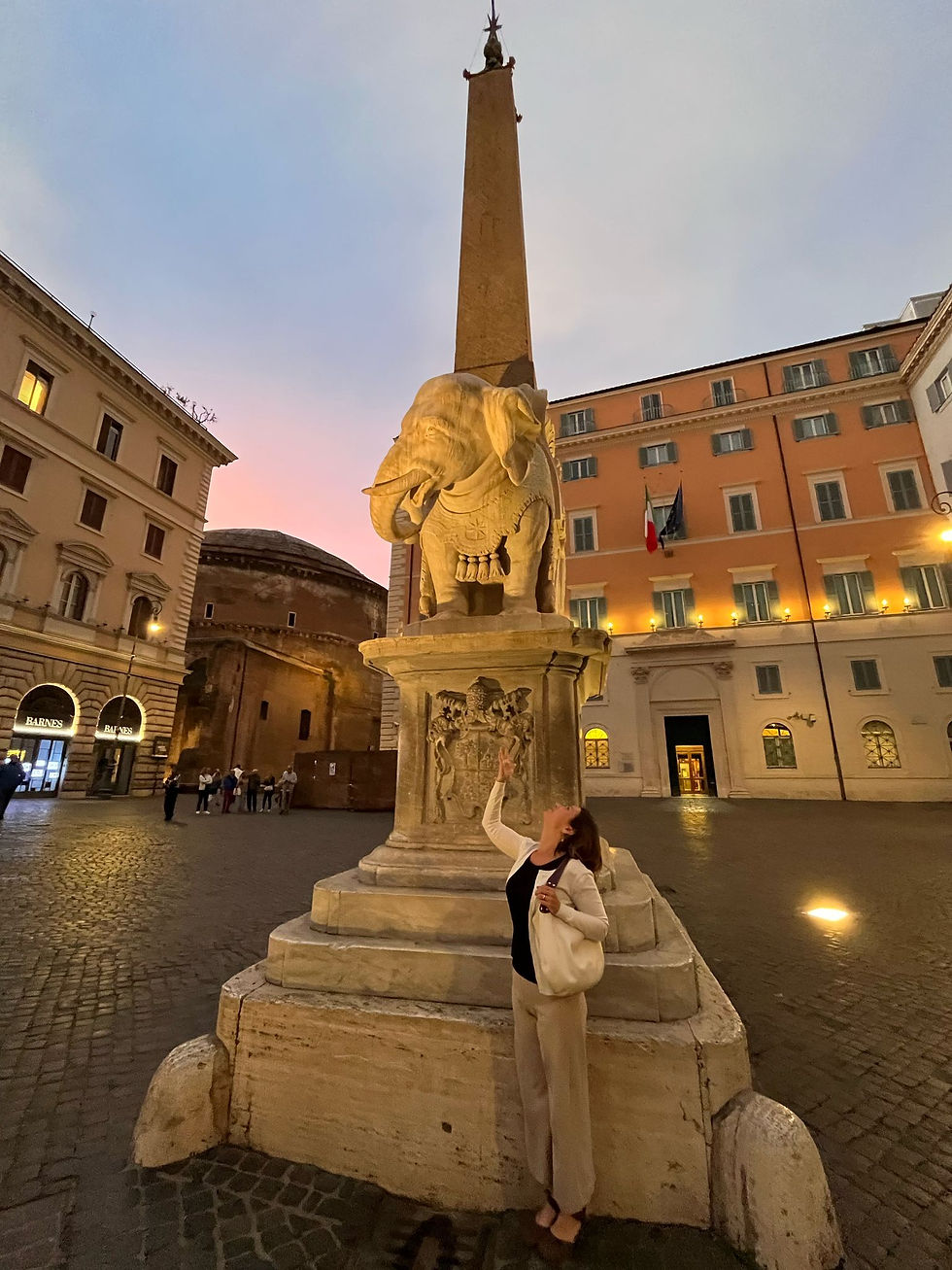Calendar Class of April 30, 2025
- Andrea Kirk Assaf

- Apr 30
- 3 min read
A Carpe Diem Snapshot:

This chubby, whimsical elephant ("Minerva's Piglet") is my favorite palimpsest in Rome, in one of my favorite public spaces in Rome- the Piazza della Minerva. Yesterday evening Marie-Therese and I attempted to capture the celestial post-thunderstorm palette, but the phone camera really couldn't pick up the multi-colored glow. The pantheon's dome set off by a pink sky hints at what we saw, at least.
Minerva, the goddess of wisdom, is a wonderful Roman archetype, and our mercurial cat bears her name. The elephant, known for its remarkable memory, is a popular artistic representation of wisdom and strength, hence the inscription on one side of the pedestal: "Let any beholder of the carved images of the wisdom of Egypt on the obelisk carried by the elephant, the strongest of beasts, realize that it takes a robust mind to carry solid wisdom."
If you're curious about the science behind the elephants' cerebral celebrity, take a look at this: "Elephants have such great memory because they have a very large brain. They have a highly developed hippocampus and cerebral cortex, which is responsible for willpower and problem-solving. It is due to these brain qualities of elephants that grants them such amazing memories."
Liturgical: Wednesday of the Second Week of Easter
John 3:16-21
“For God so loved the world that he gave his only Son, so that everyone who believes in him may not perish but may have eternal life.Indeed, God did not send the Son into the world to condemn the world, but in order that the world might be saved through him. Those who believe in him are not condemned; but those who do not believe are condemned already, because they have not believed in the name of the only Son of God. And this is the judgment, that the light has come into the world, and people loved darkness rather than light because their deeds were evil. For all who do evil hate the light and do not come to the light, so that their deeds may not be exposed. But those who do what is true come to the light, so that it may be clearly seen that their deeds have been done in God.”
Sanctoral: Pius V (January 17, 1504 – May 1, 1572)
Pius V was elected in 1566 and charged with the task of implementing the sweeping reforms called for by the Council of Trent. He ordered the founding of seminaries for the proper training of priests. He published a new missal, a new breviary, a new catechism, and established the Confraternity of Christian Doctrine classes for the young. Pius zealously enforced legislation against abuses in the Church. He patiently served the sick and the poor by building hospitals, providing food for the hungry, and giving money customarily used for the papal banquets to poor Roman converts. His decision to keep wearing his Dominican habit led to the custom–to this day–of the pope wearing a white cassock.
Human:
311 Roman Emperor Galerius issues the Edict of Toleration, ending the persecution of Christians in the Roman Empire
711 Islamic conquest of Iberia: Moorish troops led by Tariq ibn Ziyad land at Gibraltar to begin their invasion of the Iberian Peninsula (Al-Andalus)
1562 Jean Ribault and colonists arrive in Florida, the first French colonists in North America
Italian: Lunatico (moody)
Quote: When April steps aside for May,
Like diamonds all the raindrops glisten,
Fresh violets open every day,
To some new bird each hour we listen.
—Lucy Larcom, American poet (1826-93)





Comments